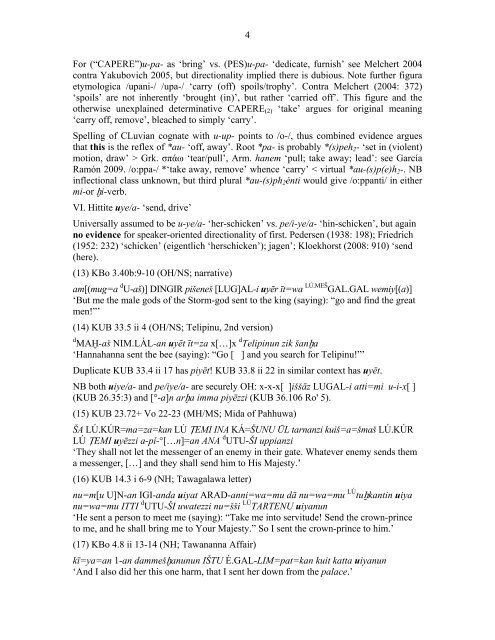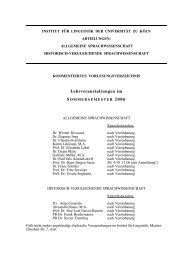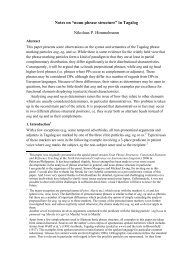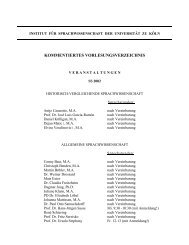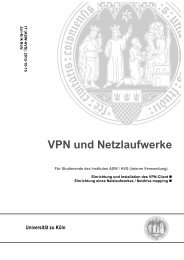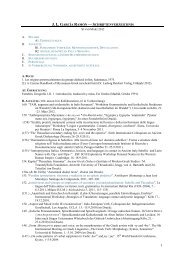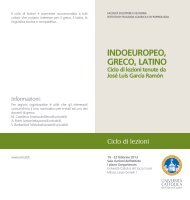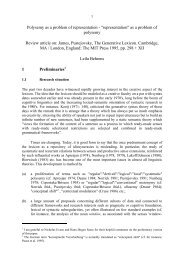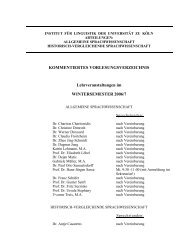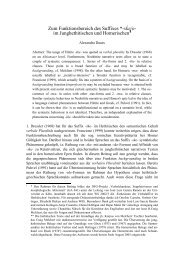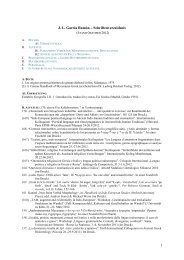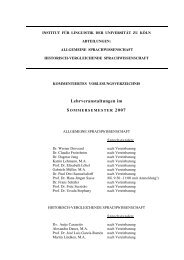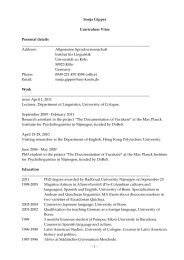Topics in Anatolian Historical Grammar Prof. Dr. H. Craig Melchert
Topics in Anatolian Historical Grammar Prof. Dr. H. Craig Melchert
Topics in Anatolian Historical Grammar Prof. Dr. H. Craig Melchert
You also want an ePaper? Increase the reach of your titles
YUMPU automatically turns print PDFs into web optimized ePapers that Google loves.
4<br />
For (“CAPERE”)u-pa- as ‘br<strong>in</strong>g’ vs. (PES)u-pa- ‘dedicate, furnish’ see <strong>Melchert</strong> 2004<br />
contra Yakubovich 2005, but directionality implied there is dubious. Note further figura<br />
etymologica /upani-/ /upa-/ ‘carry (off) spoils/trophy’. Contra <strong>Melchert</strong> (2004: 372)<br />
‘spoils’ are not <strong>in</strong>herently ‘brought (<strong>in</strong>)’, but rather ‘carried off’. This figure and the<br />
otherwise unexpla<strong>in</strong>ed determ<strong>in</strong>ative CAPERE (2) ‘take’ argues for orig<strong>in</strong>al mean<strong>in</strong>g<br />
‘carry off, remove’, bleached to simply ‘carry’.<br />
Spell<strong>in</strong>g of CLuvian cognate with u-up- po<strong>in</strong>ts to /o-/, thus comb<strong>in</strong>ed evidence argues<br />
that this is the reflex of *au- ‘off, away’. Root *pa- is probably *(s)peh 2 - ‘set <strong>in</strong> (violent)<br />
motion, draw’ > Grk. σπάω ‘tear/pull’, Arm. hanem ‘pull; take away; lead’: see García<br />
Ramón 2009. /o:ppa-/ *‘take away, remove’ whence ‘carry’ < virtual *au-(s)p(e)h 2 -. NB<br />
<strong>in</strong>flectional class unknown, but third plural *au-(s)ph 2 énti would give /o:ppanti/ <strong>in</strong> either<br />
mi-or ḫi-verb.<br />
VI. Hittite uye/a- ‘send, drive’<br />
Universally assumed to be u-ye/a- ‘her-schicken’ vs. pe/i-ye/a- ‘h<strong>in</strong>-schicken’, but aga<strong>in</strong><br />
no evidence for speaker-oriented directionality of first. Pedersen (1938: 198); Friedrich<br />
(1952: 232) ‘schicken’ (eigentlich ‘herschicken’); jagen’; Kloekhorst (2008: 910) ‘send<br />
(here).<br />
(13) KBo 3.40b:9-10 (OH/NS; narrative)<br />
am[(mug=a d U-aš)] DINGIR pišeneš [LUG]AL-i uyēr īt=wa LÚ.MEŠ GAL.GAL wemiy[(a)]<br />
‘But me the male gods of the Storm-god sent to the k<strong>in</strong>g (say<strong>in</strong>g): “go and f<strong>in</strong>d the great<br />
men!”’<br />
(14) KUB 33.5 ii 4 (OH/NS; Telip<strong>in</strong>u, 2nd version)<br />
d MAḪ-aš NIM.LÀL-an uyēt īt=za x[…]x d Telip<strong>in</strong>un zik šanḫa<br />
‘Hannahanna sent the bee (say<strong>in</strong>g): “Go [ ] and you search for Telip<strong>in</strong>u!”’<br />
Duplicate KUB 33.4 ii 17 has piyēt! KUB 33.8 ii 22 <strong>in</strong> similar context has uyēt.<br />
NB both uiye/a- and pe/iye/a- are securely OH: x-x-x[ ]iššāz LUGAL-i atti=mi u-i-x[ ]<br />
(KUB 26.35:3) and [°-a]n arḫa imma piyēzzi (KUB 36.106 Ro' 5).<br />
(15) KUB 23.72+ Vo 22-23 (MH/MS; Mida of Pahhuwa)<br />
ŠA LÚ.KÚR=ma=za=kan LÚ ṬEMI INA KÁ=ŠUNU ŪL tarnanzi kuiš=a=šmaš LÚ.KÚR<br />
LÚ ṬEMI uyēzzi a-pí-°[…n]=an ANA d UTU-ŠI uppianzi<br />
‘They shall not let the messenger of an enemy <strong>in</strong> their gate. Whatever enemy sends them<br />
a messenger, […] and they shall send him to His Majesty.’<br />
(16) KUB 14.3 i 6-9 (NH; Tawagalawa letter)<br />
nu=m[u U]N-an IGI-anda uiyat ARAD-anni=wa=mu dā nu=wa=mu LÚ tuḫkant<strong>in</strong> uiya<br />
nu=wa=mu ITTI d UTU-ŠI uwatezzi nu=šši LÚ TARTENU uiyanun<br />
‘He sent a person to meet me (say<strong>in</strong>g): “Take me <strong>in</strong>to servitude! Send the crown-pr<strong>in</strong>ce<br />
to me, and he shall br<strong>in</strong>g me to Your Majesty.” So I sent the crown-pr<strong>in</strong>ce to him.’<br />
(17) KBo 4.8 ii 13-14 (NH; Tawananna Affair)<br />
kī=ya=an 1-an dammešḫanunun IŠTU É.GAL-LIM=pat=kan kuit katta uiyanun<br />
‘And I also did her this one harm, that I sent her down from the palace.’


